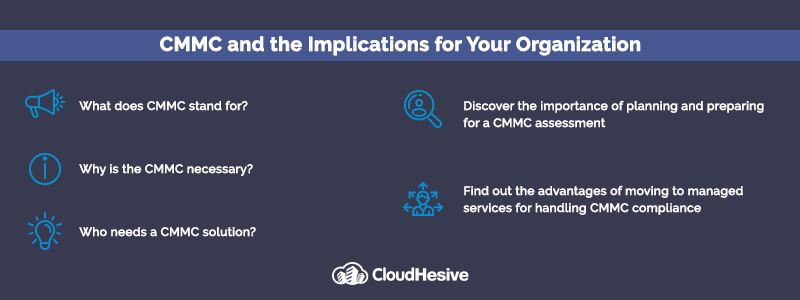CMMC implications and solutions – who needs a CMMC solution?

The federal government’s CMMC compliance requirements will take effect in 2026. Now is the time to build an understanding of how the CMMC regulatory requirements impact your business.
Planning for and managing compliance needs for the CMMC takes time, knowledgeable resources, planning, and significant preparation. CMMC is required for all federal contractors doing business with the Department of Defense (DoD) and includes multiple levels of compliance. The time to complete the assessment and authorization process can take months. Without successful certification, vendor contracts face cancellation.
Plan now for improvements to business operations for your business’s required CMMC compliance level(s). Overwhelmed trying to meet the CMMC assessment and certification standards? Consider switching to managed services to ensure federal business continuity and ongoing CMMC compliance for all levels.
This guide provides information on the CMMC, its purpose, what businesses are affected, managing assessments, and how managed services handle CMMC compliance.
What does CMMC stand for?
The acronym CMMC stands for Cybersecurity Maturity Model Certification. The DoD developed the CMMC program to improve security standards within contractor and subcontractor services. The program’s goal is to ensure third-party products follow an enforced security standard by using assessment and certification. The CMMC ensures that all vendors for the DoD apply consistent and standardized information security controls.
The CMMC includes three levels of security compliance. Each business must meet its level as well as any levels below.
The three levels of CMMC include:
- Level 1 – Safeguard federal contract information (FCI)
- Level 2 – Protect unclassified but sensitive information (CUI)
- Level 3 – Protect CUI and reduce the risk of advanced persistent threats or APT
Why is the CMMC necessary?
The CMMC is necessary to ensure that sensitive data is secured consistently and completely within the federal system. This provides security for users, contractors, federal employees, and federal government systems. Ongoing and persistent cybersecurity threats continue to increase, making the need for securing all sensitive information a national concern. Companies differ in their approach to security. The CMMC enforces a consistent and reliable approach to securing non-federal systems.
The CMMC’s goal is to protect and secure all data on non-federal information systems. The certification and assessment process ensures that CMMC security standards are met. Businesses that fail to comply with CMMC will not be performing often lucrative work for the DoD as contractors or subcontractors.
The CMMC is necessary for securing data across four component levels. The four component levels include:
- Domains
- Capabilities
- Processes
- Practices
Each CMMC level includes different compliance requirements. Security compliance requirements help protect data from persistent and ongoing cyber threats and attacks. Many cybersecurity attacks start by attacking the supply chain. Supply chains typically include businesses with one or more improperly secured instances. Once an attacker finds a vulnerability, the attack can funnel into the connected systems. The CMMC intends to eliminate security holes within the supply chain where federal data may be compromised.
Who needs a CMMC solution?
This impacts any business that is a federal contractor or subcontractor doing business with the DoD. If your organization bids on federal contracts that contain sensitive information, CMMC compliance is required. Even businesses that subcontract to a federal contractor are required to meet CMMC regulations. If your business is within the defense contract supply chain, compliance with the CMMC is required.
CMMC compliance is also impacted by the level assigned for compliance. A level 2 organization must meet tri-annual assessments to stay in compliance, and level 3 organizations are also subject to tri-annual compliance assessments. Ensuring the business selects the right level of compliance is critical. Keep in mind that your CMMC level also means compliance with any lower levels.
Are you ready for CMMC?
Is your business prepared for three CMMC assessments per year to stay compliant for levels 2 and 3? The preparation alone for a CMMC audit can stretch your resources thin.
Steps to prepare for a CMMC audit include:
- Assessing the CUI environment and all assets associated with or contacted by CUI
- Determine the certification level for the business
- Performing a readiness assessment to determine what requirements the business meets and where work needs to be done
- Implement all missing or non-compliant security requirements
- Set up continuous monitoring that reports any security incidents within the system to the DoD on an ongoing basis
Federal contracts are a lucrative business. Performing subcontract work for federal contractors generates significant business revenue as well. The CMMC will go into effect starting in 2026. Are you going to be ready? If not, your business could lose a significant source of revenue.
Proactive consideration about moving to a managed service provider could be the answer to meeting your CMMC compliance needs. Managed service providers can assess current compliance levels and develop the missing system requirements. Additionally, managed service providers can determine your CMMC level and manage assessment preparation, assessment results, and ongoing security monitoring with the DoD.
Managed service providers are there to protect your business and ensure compliance. This includes readiness services, document and artifact creation, ongoing compliance management, and support. Keep in mind that any managed service provider must also meet CMMC requirements for compliance. Knowledge and support are crucial to a complete understanding of your compliance needs.
Do you need a solution for CMMC? You may have questions about what you need or how to proceed. CloudHesive provides support and deep expertise in using Amazon-managed services and serverless architecture systems. As an Amazon Managed Services partner, and Amazon Premier Partner, CloudHesive helps businesses take full advantage of all AWS features, including serverless architecture implementation and management to ensure CMMC compliance. See what other customers have to say in case studies available from CloudHesive.



